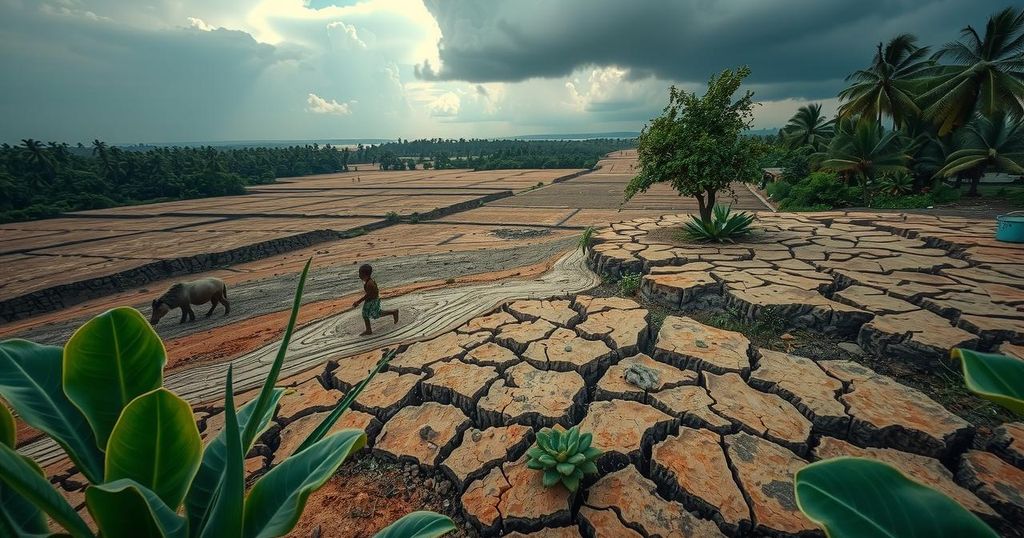Climate change
Technology
AMAZON, ASIA, AZERBAIJAN, BAKU, BE, BRAZIL, CATHERINE RUSSELL, CLIMATE CHANGE, COPERNICUS CLIMATE CHANGE SERVICE, DISASTER RELIEF, EARTH OBSERVATORY, EU, EUROPEAN UNION, FOOD SECURITY, MEXICO, NASA, NASA ’ S EARTH OBSERVATORY, NATURAL DISASTERS, NORTH AMERICA, PHILIPPINES, SOUTH AMERICA, SPACE, UN, UN CHILDREN ’ S FUND, UN UNICEF, UNICEF, UNITED NATIONS, UNITED STATES SPACE
Leila Ramsay
0 Comments
UN Reports Over 420,000 Children Affected by Drought in Amazon Basin
More than 420,000 children are affected by severe drought and water scarcity in the Amazon basin, according to the UN. UNICEF calls for urgent climate financing to address the crisis, which severely impacts Indigenous communities in Brazil, Colombia, and Peru, leading to food insecurity and school closures. The drought is tied to the El Nino climate phenomenon, prompting appeals for funding to support affected children.
The United Nations has reported that over 420,000 children across the Amazon basin are currently experiencing severe drought and water scarcity, a crisis affecting Brazil, Colombia, and Peru. UNICEF has highlighted the detrimental impact of this ongoing drought, which has persisted since last year, particularly on Indigenous communities reliant on navigable waterways. As leaders prepare for the upcoming COP29 climate summit in Azerbaijan, urgent calls for increased climate financing for children have been made to mitigate the effects of this climate crisis. The situation is dire, as the drought has resulted in widespread food insecurity and limited access to essential resources, such as food, water, healthcare, and education. The UN Children’s Fund Executive Director, Catherine Russell, emphasized the vital need to address these extreme climate conditions to protect the health and future of vulnerable children in these regions. The consequences of the drought have already led to school and clinic closures across the affected countries, exacerbating the challenges these communities face. UNICEF has expressed an urgent need for $10 million in aid for the affected regions to provide essential services, including access to drinking water and health care. The current drought has been attributed to the El Nino climate phenomenon, which has resulted in decreased rainfall, leading to dangerously low river levels and further environmental degradation across the Amazon basin. Despite these challenges, Brazilian Environment Minister Marina Silva highlighted that it is possible for governments to combat climate change effectively, citing a significant reduction in deforestation rates.
The Amazon region faces unprecedented drought conditions that have led to alarming water scarcity for its vulnerable populations. This situation has been linked not only to climate trends such as El Nino but also to the broader impacts of climate change on the environment. As communities in Brazil, Colombia, and Peru struggle with food insecurity, the UN emphasizes the need for urgent international support to avert a humanitarian crisis among children. The COP29 summit provides an opportunity for world leaders to prioritize climate financing, particularly for the most affected demographics, including children.
In summary, the ongoing drought in the Amazon basin has severely impacted over 420,000 children, highlighting the urgent need for intervention and increased climate financing. UNICEF’s appeals underscore the critical situation facing vulnerable communities in Brazil, Colombia, and Peru, where access to essential services has been drastically reduced. The international community must act decisively to address these climate-induced challenges and safeguard the future of children in the Amazon region.
Original Source: www.aljazeera.com




Post Comment